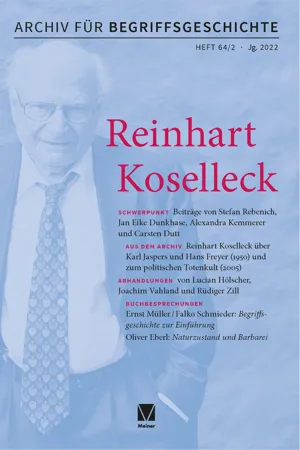
Archiv für Begriffsgeschichte. Band 64,2
Schwerpunkt: Reinhart Koselleck
- 194 Seiten
- German
- PDF
- Über iOS und Android verfügbar
Archiv für Begriffsgeschichte. Band 64,2
Schwerpunkt: Reinhart Koselleck
Über dieses Buch
Dutt, Carsten: Inhalt / Vorwort.Rebenich, Stefan: Reinhart Koselleck und die Alte Geschichte.A tour through Reinhart Koselleck's extensive library shows his intimacy with Greek and Latin texts, almost reminiscent of the Humanist postulate ad fontes. Furthermore, the paramount importance of Greek historiography is obvious in Koselleck's efforts to formulate a theory of history and gauge the possibilities and limits of historical knowledge. He saw Thucydides in particular as the archegetes of modern historiography. His reference to the historiographical and philosophical tradition of Greco-Roman antiquity allowed him to analyze and bring to consciousness »the peculiarity of modern times as a new time and the history of time as time«. Talking about Reinhart Koselleck and ancient history always means talking about Christian Meier. In no other field did the two historians work more closely together than in the field of conceptual history. Through his work, Meier consistently historicized antiquity, which he perceived as rather alien, but whose significance for the present he underscored from the perspective of reception. Koselleck, on the other hand, who described temporalization (»Verzeichtlichung«) as the decisive criterion of modernity, detemporalized antiquity in order to advance to the supra-temporal proprium of ancient historiography and philosophy, which is an essential component of his own theory of history.Dunkhase, Jan Eike: Zwischen Kafka und Hamlet. Reinhart Kosellecks publizistische Anfänge im KontextThe paper introduces Reinhart Koselleck's first three publications from the years 1951–53, which present the future historian as a literary critic. They report on a Kafka workshop organized by students at the University of Heidelberg and review a contemporary novel by Paul Schallück as well as a Hamlet interpretation promoted by Carl Schmitt. Koselleck's articles are analyzed within the context of the student magazine they were published in and contrasted with his fellow student Hans Robert Jauss' first publication in the same Forum academicum. While young Koselleck doesn't express himself as an historian in these early publications, they shed light on his intellectual beginnings in the shadow of his emerging doctoral thesis Critique and Crisis, especially concerning his foundational struggle with »the transcendence of history.«Kemmerer, Alexandra: Ad limina. Koselleck und die völkerrechtliche Imagination in der KriseEarly in his academic career, Reinhart Koselleck developed an interest in questions of international law. However, the historiography of international law, which has undergone a very dynamic evolution for almost three decades, remains little interested in Koselleck's conceptualhistorical method. In this paper, I trace Koselleck's association with international law scholars – particularly with Carl Schmitt, with whom he maintained an exchange beginning with the latter's Nomos der Erde (1950) and continuing through Die legale Weltrevolution (1978). I strive to uncover the mutual influences and the significance of this cooperation for today's transdisciplinary legal research.Their perspectives and possibilities through the conceptual-historical method are discussed in closing, before I return to the end of the world, where land and sea meet and where this text began.Dutt, Carsten: »Beihilfe zur Ernüchterung«.Dunkhase, Jan Eike: Die Frage nach der Geschichte. Eine Doppelrezension Reinhart Kosellecks aus dem Jahr 1950Koselleck, Reinhart: Rezension zu Hans Freyer, Weltgeschichte Europas, und Karl Jaspers, Vom Ursprung und Ziel der Geschichte.Koselleck, Reinhart; Dutt, Carsten: Zum politischen Totenkult. Ein InterviewHölscher, Lucian: The Discovery of the Future in Early Modern Europe.My argument for the discovery of the future is based on the idea of a process of temporalization that took place in early modern Europe.
Häufig gestellte Fragen
Information
Inhaltsverzeichnis
- Cover
- Inhaltsverzeichnis
- VORWORT
- SCHWERPUNKT
- AUS DEM ARCHIV
- ABHANDLUNGEN
- BUCHBESPRECHUNGEN
- Die Autorinnen und Autoren